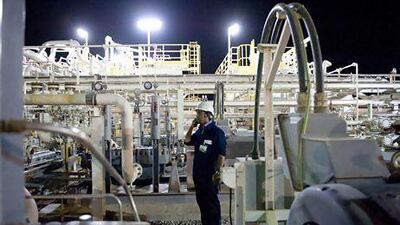Bureaucratic red tape is hampering efforts to ramp up oil production in Iraqi Kurdistan, with companies struggling to procure equipment and visas.
"It's a barrier to getting there," said Dave Hanson, a project manager at DNO International, which is looking to double output at one of the autonomous region's largest oilfields. "Unfortunately, we can't find a way to work with it, we have to find a way to work around it."
DNO, which last year merged with the UAE's RAK Petroleum, was granted three licences by the Kurdish Regional Government (KRG), and is producing about 100,000 barrels per day (bpd) at the Tawke field. The company is racing to increase production further, and is targeting a capacity of 200,000 bpd by the end of 2014. Time is money, as it needs to empty the field of its 700 million barrels of reserves before DNO's concession expires in 2030.
The KRG is relying on companies such as DNO to raise production capacity in the region from its current 250,000 bpd to 1million bpd in the next two years.
International oil companies (IOCs) already have to cope with intermittent and insufficient payments for their product, as Iraq's central government tries to rein in the Kurdish oil boom by withholding funds.
Their efforts are further hamstrung by a shortage of qualified staff which stems from the government's unwillingness to issue visas to foreign workers in an attempt to create jobs for Kurds. But a lack of expertise is making it hard for companies to recruit locally, and the dearth of foreign expertise is hindering efforts to train Kurds.
"It's in our interest, and our policy, to give as much work as we can to local people, but it's very difficult because the local resources and services are not geared up to the oil industry as they are in other places in the world," said Mr Hanson.
Government policy has also created a shortage of contractors and suppliers operating in the region.
"The MNR [Ministry of Natural Resources] doesn't make it easy for companies to register with them, and they don't understand the complexity of procurement in the oil industry," said Mr Hanson.
"The procurement policy of the government doesn't accept that [complexity], and it makes it difficult."
Kurdistan is one of the world's last oil frontier regions. Granted semi-autonomy under Iraq's post-Saddam constitution, the KRG has welcomed in IOCs to develop its vast resources. Smaller companies have followed the lure of the lucrative contracts offered by the Kurds, and the oil majors ExxonMobil, Total and Chevron have recently followed suit.
They have done so against the wishes of Baghdad, which fears that energy independence will encourage the Kurds to break away from Iraq.
A region that was untapped a decade ago is now struggling to cope with the influx. Its young government, keen on developing local businesses, is adding to a lack of infrastructure with clumsy measures to promote local industry by restricting access for experienced international service providers.
"There are huge problems getting contractors in Kurdistan, and contractors have huge problems getting into Kurdistan," said Mr Hanson, who spoke at a Meed conference in Abu Dhabi.
DNO is dealing with the bottleneck by minimising the amount of contractors it uses in the KRG, and adopting a modular approach used in constructing offshore production sites.
Much of the new production sites will be constructed outside Kurdistan in countries such as the UAE or neighbouring Turkey, and shipped in as large modules.

